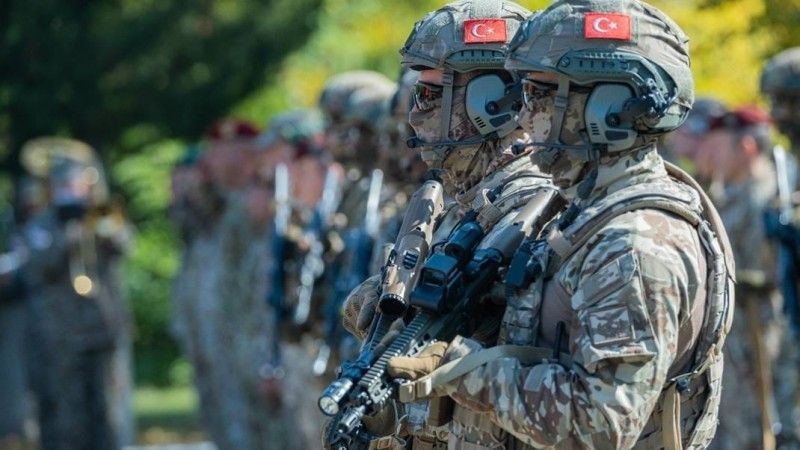Geopolitics
Türkiye gives the green light to Sweden's NATO bid

After almost two years of mutual accusations, the burning of the Koran, the destruction of Swedish flags and several summits where attempts were made to reach a compromise, Türkiye gave the green light to the Swedes. And so, on January 23 this year, after many hours of deliberations in the General Assembly of the Turkish Parliament, Sweden’s accession to NATO was finally approved by a large majority.
- Why did Türkiye block Sweden's accession to NATO?
- F-16 and weapons as a condition for consent to Sweden's accession.
- Who voted and how?
As a result of Russian aggression against Ukraine and growing security concerns in the region, Sweden and Finland submitted an application to join the North Atlantic Alliance in May 2022. Although Finland did not meet all of Türkiye’s demands, including the extradition of people accused of committing terrorist crimes, in April last year it officially became the 31st member of NATO. In the case of Sweden, the Turkish authorities considered the actions it had taken to be insufficient. Therefore, Stockholm had to wait a few more months for Ankara’s acceptance. Türkiye’s position softened only after Sweden adopted anti-terrorism regulations in June last year and decided to support Turkish ambitions to modernize the customs union and liberalize the visa regime in the European Union.
Why did it take so long?
The official reason for Türkiye’s abstention from ratification was Swedish legislation, which, according to Ankara, protected groups accused of having links with Kurdish terrorist groups (mainly the Kurdistan Workers« Party - PKK), as well as Stockholm’s lack of reaction to the spectacular desecration of the Muslim holy book, which was criticized not only by followers of the Islamic faith, but also by representatives of other religions. Such actions were seen as an abuse of freedom of speech and expression. However, the unofficial reason was the United States refraining from selling F-16s to Türkiye and Canada’s lack of decision to lift the arms embargo imposed on this country.
Both situations were related to the positive consideration of the Swedish application for NATO membership. However, due to the lowest level of trust between Ankara and Washington in years, neither side wanted to make the first move, fearing that their partner would withdraw from the gentlemen’s agreement at a crucial moment. Another factor was the October 7 Hamas attack on Israel and the subsequent devastating war in Gaza, which roughly coincided with the opening of the Turkish parliament. It is worth emphasizing that Türkiye openly supports Palestinian aspirations, which is why it stands in opposition to the United States, which is Israel’s greatest ally.
In the context of the lack of progress in the ratification of the Swedish application, it is worth mentioning the role of the chairman of the foreign affairs committee of the Turkish parliament, Fuat Oktay, who was himself responsible for delaying the process since October last year. Oktay allegedly visited Erdoğan around the time of the opening of parliament, presenting arguments against Sweden joining NATO. He believed that Türkiye’s Western allies, especially the US, did not take the Turkish parliament seriously and should not be trusted with the F-16, mainly because of the separation of powers in the American political system, in which the American president cannot simply force senators to adopt a decision that he himself demands. Thus, he recommended not to rush into making a final decision, which would ultimately result in greater concessions from the Swedes or Americans.
According to some sources, Erdoğan finally agreed with Oktay’s plan and views, which were conveyed to the party leadership at one of the meetings. The war in Gaza has only strengthened this position. Oktay himself told the media that Stockholm needs to do more to convince parliamentarians to vote in favor of the proposal. He then met with the Swedish ambassador in Ankara and reiterated his expectations regarding the steps that the Swedes have to take against PKK members residing in their country.
”People should learn to take the Turkish parliament seriously… They always expect that we have to convince our Western allies. Now they must learn that we, too, need persuasion.” – Oktay said in one of the interviews.
Voting process
During the January debate, each political party was given the right to speak for 40 minutes. During the meeting, arguments were given both for and against Sweden’s membership in NATO.
287 parliamentarians voted for Sweden’s accession to the Alliance, 55 expressed opposition and 4 parliamentarians abstained. It is worth noting that there are a total of 600 people in the Turkish parliament, which shows that the new country’s accession to NATO was not a topic of particular importance for local politicians. It can also be assumed that some members of parliament preferred not to take part in the vote to avoid being associated with any of the parties. The accession was supported by the government camp: the Justice and Development Party (AKP), the Nationalist Movement Party (MHP) and the largest opposition party - the Republican People’s Party (CHP).
Istanbul MP Oğuz Kaan Salıcı, on behalf of the CHP, explained the reason for voting for „approval”, stating that no matter how bad the policies pursued by the AKP are, the interests of the Republic of Türkiye and Sweden’s membership in NATO are intertwined. However, he appealed directly to the ruling coalition, accusing it of inept policy.
”Who demands NATO membership? Sweden. Who do you negotiate planes with? With America. We were the main partner of the F-35 project, we paid for it, and five F-35 aircraft were produced in America forTürkiyefor $1.4 billion. The money was paid and our pilots received training. But we cannot bring these planes toTürkiye*. Greece will have the F-35, we will have the F-16. This means the loss of air superiority in the Aegean Sea. This is the crux of the fuss about „diplomatic success”, but we have some advice for you, you have been fooled more than once, don’t be fooled again, because we are not sure whether you will bring the F-16”.* – Oğuz Kaan Salıcı, member of the Turkish Grand National Assembly on behalf of the CHP (Republican People’s Party).
Opposition to Sweden’s membership in NATO was expressed by the Good Party (İYİ) and the nationalist-conservative the Felicity Party (SAADET), of which only one MP abstained from voting. These parties justified their decisions by insufficient progress in implementing Turkish demands and the lack of confidence that Sweden would keep its word, emphasizing that „promises made behind closed doors have no meaning”.
Koray Aydın, an MP from the İYİ Party from Ankara, said on behalf of his party that he would vote against it.”It is absolutely clear that the so-called steps taken by Sweden against terrorism are intended to misleadTürkiyeand international public opinion… WhenTürkiyesays »yes«, it will be deprived of all opportunities for negotiations that (currently - editor’s note) has”.
Although the Peoples« Equality and Democracy Party (DEM) maintained its opposing position, a significant number of its members of parliament decided not to take part in the voting at all. DEM Party vice-chairman Gülistan Kılıç Koçyiğit used the term „two-faced” in reference to the AK Party’s negotiation process with Sweden. He accused the ruling coalition of negotiating the new member’s accession to NATO based on „hostility towards the Kurds.””As a result, today, when Swedes are being pushed into an »either NATO or Putin« climate, the AKP government’s policy is trying to turn it into a »Kurds or NATO« dilemma, which will not be erased from the shameful pages of history,” Koçyiğit said.
In turn, the Future Party (GP), despite many negative comments directed at Sweden, ultimately supported its application.”As the Party of the Future, we propose a constructive understanding of politics in the Grand National Assembly ofTürkiyeon all issues relating to the interests of our state and nation. I would like to express that we positively assess Sweden’s attitude in supporting the oppressed Palestinians who are victims of crimes against humanity in Gaza. Before voting, we prefer to draw attention to the erroneous foreign policy of the (Swedish - editor’s note) government, but we want to declare that as the Future Party we are not against Sweden’s membership in NATO, so as not to isolate and excludeTürkiyein the region and international arena in the coming period” – said Future Party MP in Istanbul İsa Messi Şahin.
The AKP lost three votes in the vote. The party’s MPs from Istanbul - İsmail Erdem and Cemil Yaman from Kocaela - voted „no”. Mardin MP Muhammed Adak „abstained from voting”. MHP, on the other hand, said yes without any loss. The other parliamentarians who „abstained” from voting were CHP MP from Samsun - Murat Çan and DEVA MP from Istanbul - Elif Esen.
The new Prosperity Party (YRP), which entered the Turkish Grand National Assembly on May 14 last year under the patronage of the People’s Alliance, also voted to reject the Swedish proposal. The Free Cause Party (HÜDA PAR), the Democratic Party (DP), the Turkish Workers« Party (TİP) and the Workers« Party (EMEP) voted similarly. TİP Chairman Erkan Baş added:”We are against NATO itself, we are againstTürkiye*’s membership in NATO and we are against NATO expansion”.* The influence of this party on the vote result, as well as on the overall policy pursued by Türkiye, is negligible and does not represent the values and views presented by the majority of Turkish society.
A positive change
The approval of Sweden’s membership in NATO by the Turkish Grand National Assembly is an irreversible step. The only factor stopping this country’s final accession is Hungary’s consent, which is quite difficult to obtain. Nevertheless, even if the US does not keep its promise to President Erdoğan and the F-16 or F-35 is not sold, Sweden will still become the 32nd member of NATO. Recent events show that Erdoğan had to take this political risk. Ultimately, this may bring not only material benefits, but also help rebuild trust in Türkiye among its Western allies. United States Ambassador to Türkiye Jeff Flake, making a statement on his social media, wrote:”The Turkish Parliament has approved Sweden’s accession to NATO. A great move for Sweden,Türkiyeand all of NATO”. Positive signals coming from the US regarding the sale of the F-16, as well as the strengthening of Türkiye’s position on the war in Ukraine, show that the Alliance is on the right track to rebuilding stable cooperation.
